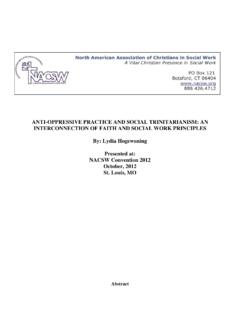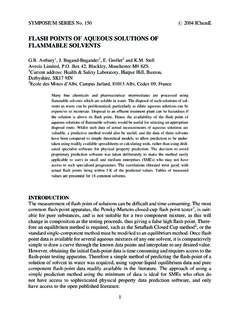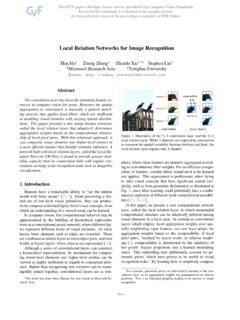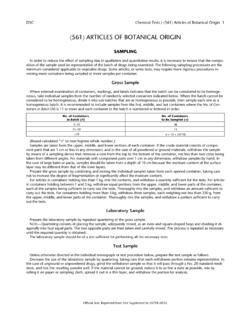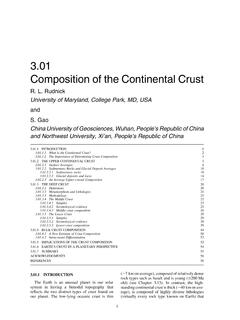Transcription of SPIRITUAL ASSESSMENT: A REVIEW OF COMPLEMENTARY …
1 CHAPTER 10 SPIRITUAL ASSESSMENT: A REVIEW OFCOMPLEMENTARY ASSESSMENT MODELSD avid R. Hodge and Crystal HoltropAssessment is considered by many to be an underdeveloped area in socialwork (Mattaini & Kirk, 1991). The lack of development is particularlyacute in the area of SPIRITUAL assessment (Bullis, 1996; Sherwood, 1998).For instance, numerous studies have found that most social workers havereceived no training in the area of SPIRITUAL assessment (Bullis, 1996; Canda& Furman, 1999; Derezotes, 1995; Sheridan & Amato-von Hemert, 1999;Furman & Canda, 1994). The lack of attention devoted to SPIRITUAL assess-ment represents a significant oversight.
2 Four issues, ontology, ethics,strengths, and autonomy will be discussed in brief to highlight the impor-tance of SPIRITUAL assessment in social is often central to clients personal ontology, meaning itmay be the essence of their personhood. Spirituality may inform atti-tudes and practices in such areas as child rearing, diet, marriage, medi-cal care, military participation, recreation, schooling, social interactions,as well as many other dimensions of life (DiBlasio, 1988; Rey, 1997).For one third of the general population, religion is the most importantfacet of their lives and over 50% consider it to be a very important as-pect of their lives (Gallup & Lindsay, 1999; Walsh, 1999).
3 Further, forAfrican Americans, Hispanics, women, the elderly, the poor, and manyother populations of significance to social workers, spirituality is evenmore salient (Gallup & Lindsay, 1999; Pargament, 1997). The provi-sion of respectful services to these groups is often contingent upon prac-titioners awareness of clients spiritually based beliefs and practices. Inorder to provide effective services, social workers must develop someunderstanding of clients SPIRITUAL second factor stems from the profession s ethical mandates. Spiri-tuality is often expressed in distinct traditions or faith-based cultures(Fellin, 2000; Talbot, 2000).
4 The NASW Code of Ethics (1999) stipu-lates that social workers are to demonstrate competence and sensitivitytoward faith based cultures ( ) and recognizes the strengths thatexist among such groups ( ). Ethically sound practice entails ob-taining the knowledge to exhibit SPIRITUAL sensitivity to R. Hodge and Crystal HoltropSocial workers are increasingly recognizing the importance ofstrengths (Cowger, 1994; Hwang & Cowger, 1998; Saleebey, 1997).Reviews have consistently found a generally positive association betweenspirituality and a wide number of beneficial characteristics (Ellison &Levin, 1998; Gartner, Larson & Allen, 1991; Koenig, McCullough &Larson, 2001; Pargament, 1997).
5 More specifically, various dimensionsof spirituality have been associated with recovery from addiction (Turner,O Dell & Weaver, 1999), depression (Propst, 1996), divorce (Nathanson,1995), homelessness (Lindsey, Kurtz, Jarvis, Williams & Nackerud, 2000;Montgomery, 1994), serious mental illness (Sullivan, 1997), sexual as-sault (Kennedy, Davis & Talyor, 1998) as well as empowerment(Calhoun-Brown, 1998; Maton & Salem, 1995) and healing (Maton &Wells, 1995; McRae, Thompson & Cooper, 1999). While spirituality isoften an important client asset, unfortunately, these strengths often liedormant (Saleebey, 1997).
6 To tap clients SPIRITUAL assets for the pur-poses of ameliorating problems, practitioners must use methods designedto identify clients strengths (Ronnau & Poertner, 1993).Finally, there is the issue of client autonomy. Many clients desire tointegrate their SPIRITUAL beliefs and values into the helping relationship(Privette, Quackenbos & Bundrick, 1994). According to Gallup data re-ported by Bart (1998), 66% of the general public would prefer to see aprofessional counselor with SPIRITUAL values and beliefs and 81% wanted tohave their own values and beliefs integrated into the counseling , research suggests that spirituality tends to become more salientduring difficult situations (Ferraro & Kelley-Moore, 2000.)
7 Pargament, 1997),when individuals may be more likely to encounter social sum, SPIRITUAL assessment provides social workers with a meansto understand clients SPIRITUAL strengths, beliefs, and values in short their worldview. Not only is such knowledge often critical for culturallycompetent practice, in many instances it is an ethical imperative. Spiri-tual assessment provides a mechanism to identify clients SPIRITUAL re-sources and honor their desire to integrate their beliefs and values intothe clinical light of the importance of SPIRITUAL assessment, this chapter re-views a number of recently developed assessment approaches and pro-vides examples of how they may be applied in practice with Christianclients.
8 Our intent is not to provide an exhaustive REVIEW of variousassessment methods, but rather to REVIEW a specific series of assessmentinstruments. These four instruments were developed to complementone another in the hopes of providing social workers with a set of as-sessment tools for use in numerous settings with a variety of than being interchangeable, one approach may be ideal in oneSpiritual Assessment169context while another tool may be better suited to address a differentclient-to-practitioner interface. Readers are encouraged to obtain theoriginal articles in which the instruments first appeared and to becomefamiliar with the strengths and limitations of each assessment instru-ment.
9 The assessment tools may be used with a variety of different reli-gious traditions, but here we will be applying a Christian point of viewand using examples from practice with Christian defining SPIRITUAL assessment, spirituality, and religion, fourassessment instruments are reviewed SPIRITUAL genograms (Hodge,2001b), SPIRITUAL lifemaps (Hodge, in press), SPIRITUAL histories (Hodge,2001a), and SPIRITUAL eco-maps (Hodge, 2000; Hodge & Williams, inpress). A brief overview of the assets and limitations of each method isprovided and, for the three diagrammatic instruments, case examplesare provided to familiarize the reader with the instrument.
10 A brief dis-cussion on conducting an assessment concludes the assessment is defined as the process of gathering and orga-nizing spiritually based data into a coherent format that provides thebasis for interventions (Hodge, 2001a; Rauch, 1993). The subsequentinterventions may or may not be spiritually based. As implied above, aspiritual assessment may be conducted for the purposes of using tradi-tional, non- SPIRITUAL , interventions in a manner that is more congruentwith clients beliefs and is defined as an existential relationship with God (orperceived transcendence) (Hodge, 2001a). Religion flows from spiritu-ality, expressing the SPIRITUAL relationship in particular beliefs, forms,and practices that have been developed in community with other indi-viduals who share similar SPIRITUAL experiences (Hodge, 2000).



